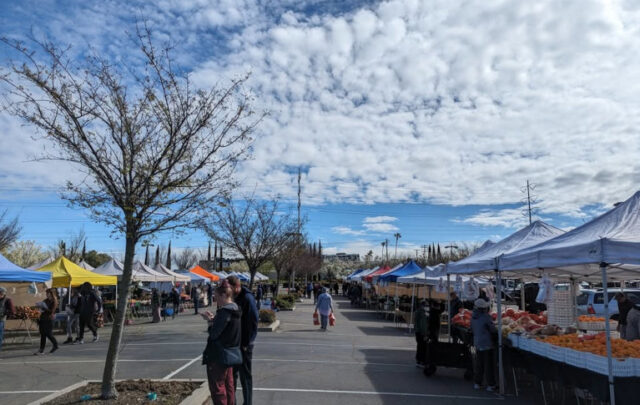Click on the headline (link) for the full text.
Many more articles are available through the Energy Bulletin homepage
Produce will sail into Ballard
Allison Espiritu, Ballard News-Tribune (Washington)
Sail Transport Network has teamed up with Sustainable Ballard and led a team of volunteers to haul an array of organic produce and food from Kitsap County Farmers to the public dock of Ballard’s Shilshole Bay Marina.
Dave Reid, co-founder of Seattle Peak Oil, took the reigns as lead engineer for Seattle’s Sail Transport Network. The concept, originally thought up by California activist Jan Lundberg, is to mitigate peak oil and climate change. The mission of the company is “natural transport for the local economy and community.”
Reid was inspired to start the program through environmental reasons, the support of local farmers, not using oil and the idea of sailing being very low impact. He was introduced to organic farmers who had water access in both Poulsbo and Sequim, explained Kathy Pelish, former volunteer communications director for Sustainable Ballard and current Sail Transport Network Media and Communications coordinator.
Reid connected and spoke with local farmers and made a deal to sail and sell their products to the Ballard community.
Reid tested four trial runs on his own and went to the community for support once he was confident with the idea.
(13 January 2009)
Background at EB: Sail Transport Network: Interview with Puget Sound sailor David Reid.
Book Review: Permaculture, a beginner’s guide
Rob Hopkins, Transition Culture
Permaculture: a beginner’s guide (second edition).
Graham Burnett.
Spiralseed Publications.
I have had a copy of the initial edition of this small book for many years. Graham both wrote and illustrated the book, and it has a very distinctive look and feel which are particular to his work. His particular background and his perspective on permaculture emerges from a long background in anarchism, veganism, and a more urban, communitarian approach than some more rural-focused writers such as Patrick Whitefield. He is also active in Transition Westcliffe-on-Sea.
The book is a clear and information-packed, and it covers most of what you would expect a short introduction to permaculture to cover. It covers the ethics and principles of permaculture, opting for Mollison’s original ones, rather than Holmgren’s revised principles. This dilemma presents an interesting choice for permaculture teachers and writers, which to use? Personally, I tend to see Mollison’s as the GCSE ones, more accessible for beginners, and Holmgren’s as the A’Level ones, for those already grounded in the basic ideas. In this regard, I think Graham gets it right opting for Mollison’s, they certainly work very well in the context of this book.
… ‘A Beginners Guide’ feels, graphically at least, stuck in some 1980s version of radical change, where the only people really pursuing change of any value are small minority groups, not anyone who carries even a whiff of the mainstream. In this world, most change of any value comes from punks, rastas, animal rights activists, anarchists and squatters. I would have loved to see, in a second edition of this highly useful book, a more up to date look at who might actually be implementing this stuff, given the degree to which it has subsequently moved on (if, indeed, it was ever like this).
What I see as I travel up and down the country meeting Transition groups, is a distinct absence of mohicans and dreadlocks (not that there’s anything wrong with those, its just that the vast majority of people don’t have them). In that sense, there is something in this book which somehow encapsulates why it is that permaculture has struggled to escape from a ghetto of its own making.
Who would I give this book to? I think as an introduction to permaculture for someone already immersed in ‘alternative’ culture, it is excellent.
(12 January 2009)
Rob has a good point. The ideas of permaculture are set to go mainstream. They make sense, they’re grounded in science and tradition, and — Lord knows — they’re sorely needed. Unfortunately the cultural overlay makes it difficult for the ideas to reach a wide audience.
For social change to take place, people need to see people like themselves adopting the new ideas. Women need to see women. Grayheads like me need to see grayheads.
Diversity is a key to success.
This is why it’s critical for permaculture and peak oil to have a wide variety of faces. Peak oil is more than technically oriented white guys, and permaculture is more than dreadlocks and hippies. -BA
Going Amish: The Decision
Shasha, Hen and Harvest
We stood huddled against the cold in the old barn on the Amish farm. We looked in awe at the beauty and craftsmanship of the hand hewn timbers. I glanced at my husband’s thinly veiled excitement and slowly realized that we would be buying the farm. This farm. My fingers traced the date, carved into the weathered wood — 1902. This farm. My husband looked at me and exclaimed in a whispered voice, “this is what we have been looking for.”
(12 January 2009)
Shasha is a regular contributor over at Hen and Harvest. Check out some of her many other informational blog posts here. KS





